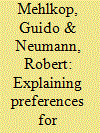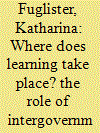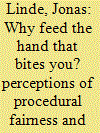| Srl | Item |
| 1 |
ID:
111906


|
|
|
|
|
| Publication |
2012.
|
| Summary/Abstract |
Explanations of different patterns of preferences for redistribution either highlight the role of the institutional framework in a country or highlight the importance of self-interest and rational expectations. The study introduces a unified approach to explain differences in preferences for redistributive measures for the case of intergenerational monetary transfers for families and children. Both explanatory approaches are integrated into the action-based Model of Frame Selection that incorporates normative motives and economic self-interest into the process of decision making. Using a large sample that deals with questions on the approval of public policies for families and accounts for the normative importance of children and family life in Germany, evidence is provided that both approaches are valid in explaining preferences for government transfers.
|
|
|
|
|
|
|
|
|
|
|
|
|
|
|
|
| 2 |
ID:
111907


|
|
|
|
|
| Publication |
2012.
|
| Summary/Abstract |
In 2005, the European Parliament rejected the directive 'on the patentability of computer-implemented inventions', which had been drafted and supported by the European Commission, the Council and well-organised industrial interests, with an overwhelming majority. In this unusual case, a coalition of opponents of software patents prevailed over a strong industry-led coalition. In this article, an explanation is developed based on political discourse showing that two stable and distinct discourse coalitions can be identified and measured over time. The apparently weak coalition of software patent opponents shows typical properties of a hegemonic discourse coalition. It presents itself as being more coherent, employs a better-integrated set of frames and dominates key economic arguments, while the proponents of software patents are not as well-organised. This configuration of the discourse gave leeway for an alternative course of political action by the European Parliament. The notion of discourse coalitions and related structural features of the discourse are operationalised by drawing on social network analysis. More specifically, discourse network analysis is introduced as a new methodology for the study of policy debates. The approach is capable of measuring empirical discourses both statically and in a longitudinal way, and is compatible with the policy network approach.
|
|
|
|
|
|
|
|
|
|
|
|
|
|
|
|
| 3 |
ID:
111904


|
|
|
|
|
| Publication |
2012.
|
| Summary/Abstract |
The extent of strategic voting in the Spanish general elections of 2000, 2004 and 2008 is estimated using a new measure of strategic incentives suitable for proportional representation systems that avoids some of the problems associated with lagged variables. Strategic behaviour increased from 12 to 33 per cent of the electoral base of the United Left Party, the major victim of strategic defection. This estimate is a conservative one as elite mobilisation is controlled for in the constituencies, which is unusual in the literature on strategic voting that uses regression-based methods.
|
|
|
|
|
|
|
|
|
|
|
|
|
|
|
|
| 4 |
ID:
111905


|
|
|
|
|
| Publication |
2012.
|
| Summary/Abstract |
Although it is widely accepted that a decentralised system can enhance policy learning and the spread of best practices, an under-researched question is where that learning process takes place. Using data on the diffusion of health care policies in Switzerland, this article analyses the role of institutionalised intergovernmental cooperation and its impact on the spread of successful policies. The results show that joint membership of policy makers in health policy specific intergovernmental bodies is related to the diffusion of best practices.
|
|
|
|
|
|
|
|
|
|
|
|
|
|
|
|
| 5 |
ID:
111908


|
|
|
|
|
| Publication |
2012.
|
| Summary/Abstract |
There is widespread agreement that bad governance and corruption represent daunting threats to new democracies and developing countries. Nonetheless, mainstream research on system support and political legitimacy has to a large extent overlooked the crucial importance of public perceptions of procedural fairness for fostering public support and regime legitimacy. Taking its departure in the theory of procedural fairness, this article challenges the conventional wisdom of earlier research by arguing and demonstrating that public perceptions of procedural fairness and impartiality on behalf of the authorities are the most important determinants of system support in the post-communist European Union Member States. The empirical analysis lends strong support to the fact that perceptions of fairness and the extent of corruption exercise a strong effect on public support for the performance of the political system and approval of regime principles.
|
|
|
|
|
|
|
|
|
|
|
|
|
|
|
|